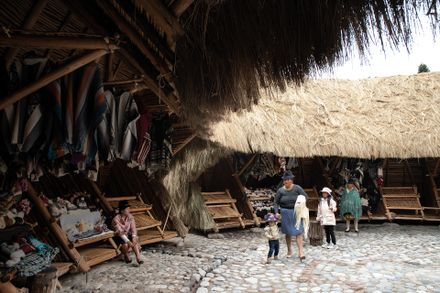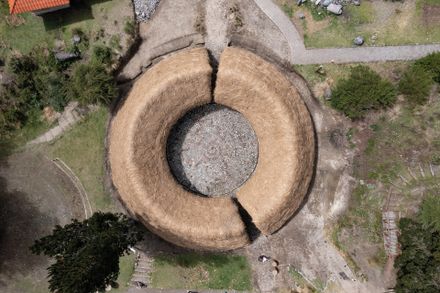Chaki Wasi, Artisanal Center of the Shalalá Community
ARCHITECTS
La Cabina De La Curiosidad
INTERNS
Samuel Dano, Marianne Letessier
DESIGN MANAGEMENT AND CONSTRUCTION
Marie Combette, Daniel Moreno Flores
CONSTRUCTION
Comunidad De Shalalá + La Cabina De La Curiosidad
STRUCTURAL CONSULTING
Patricio Cevallos
PHOTOGRAPHS
Marie Combette, Jag Studio, Samanta Martinez
YEAR
2024
LOCATION
Zumbagua, Ecuador
CATEGORY
Community Center
Text description provided by architect.
We are at the summit of the Quilotoa Lagoon, a volcanic crater with turquoise water at 3,915 meters above sea level.
The indigenous community of Shalalá promotes sustainable tourism in symbiosis with nature, valuing and magnifying it.
They have a wooden viewpoint (built-in 2013) that enhances the experience with the lagoon, along with tourist infrastructure, and now a crafts center that, through its circular form, seeks to offer the same opportunity for each stall.
With its cobblestone central plaza, it becomes a space that fosters gatherings and celebrations. The crafts center is called Chaki Wasi, which in Kichwa means "house made of straw from the ground up."
INNOVATION
Chaki Wasi's aspiration is to represent Andean culture through traditional vernacular techniques and serve as an educational platform to showcase a way of living in the Andean landscape.
It is built with river stone foundations, a structure made of eucalyptus wood tied with cabuya (fiber from the agave plant), and supported with large dowels of chakra (small pieces of young eucalyptus wood).
The hammer used to drive the dowels was a large wooden mallet; all the fastenings are made with repeatedly used chakllas, and the large roof covering is made of straw.
There is a vision of regenerating the community's land, living in harmony with nature, being carbon-positive, and returning waste to the earth. The future outlook is rooted in the wisdom and territorial knowledge of the past.
EMANCIPATION
This is a construction based on communal logic; those in charge rotated weekly. Permanent mingas (collective work parties) were held with the participation of women, men, and youth from the community.
Interesting links were formed with neighboring communities to obtain wood and straw.
Everything was built by hand, with minimal tools, and the structural modules were raised and placed with everyone's strength, thanks to ropes and collective unity.
When placing the straw, there was a transmission of vernacular knowledge, and we celebrated each stage according to Andean culture and worldview.
ADAPTABILITY
There is an intergenerational transmission of knowledge and culture in ways of doing, in rites, and customs. Culture is sustained through co-designing and co-constructing, and architecture is democratized as a fundamental asset for human development and the environment.






























